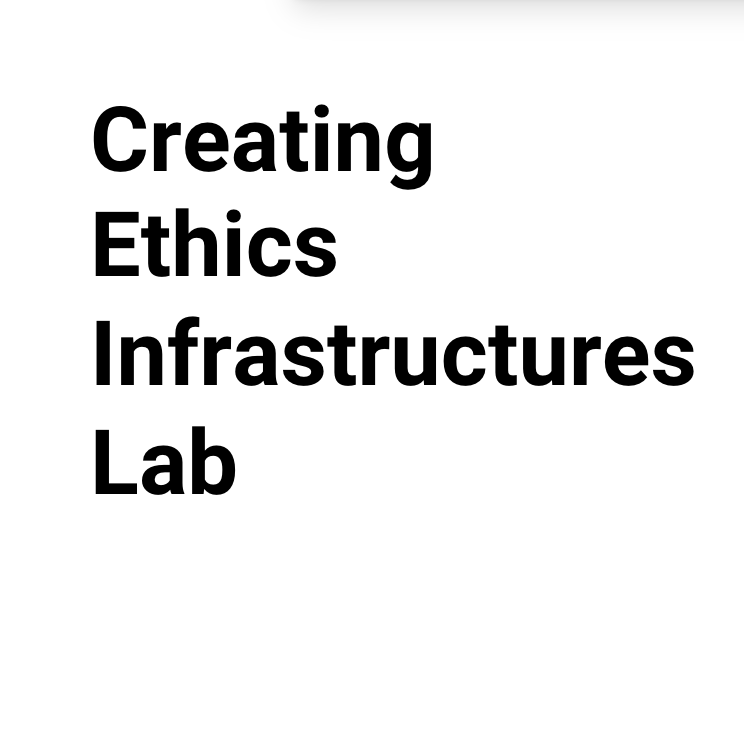Research Areas and Projects

I run the Creating Ethics Infrastructures Lab in the Digital Media Program at the Georgia Tech School of Literature, Media, and Communication.
Technology design is a social and cultural practice (as well as a technical one). Thus, helping technologists design ethical systems requires more than creating technical ethical design tools; it also requires creating social and cultural infrastructures that can help support technologists to make ethical decisions.
These infrastructures may include new organizational practices, law and policy, supporting worker and community-led actions, or developing tools that consider the social and organizational contexts where technologies are developed.
I draw on perspectives from design, science & technology studies (STS), human-computer interaction (HCI), and computer supported cooperative work (CSCW). I use qualitative methods including interviews, participant observation, and discourse analysis. I also use design as a method of inquiry by creating speculative design artifacts, conducting co-design activities, and using design to surface and reflect on ethical issues.
If you're interested in working with me as a PhD student, plese take a look at our Guide to Working in the Creating Ethics Infrastructures Lab.
If you are a Georgia Tech DM MS or MS HCI student and are interested in me supervising your final project, please send me an email to request a current list of project areas I am advising in, along with a short description of your own interests and skills.
Current projects include the following:
Studying Technology Workers’ Ethics Work in Organizational Contexts
This project studies how technology professionals--such as user experience (UX) professionals, product managers, or artificial intelligence (AI) practitioners--attend to values and ethical issues as a part of their professional work. More about this project can be read here. Some research questions here include:
- How do technology practitioners engage in ethics in practice?
- What are the gaps between how ethics work is imagined in rhetoric and tools, and how it is done in practice?
- How is responsibility for ethics distributed within an organization?
- Who does ethics work?
- What processes of ethical review and accountability exist within technology companies?
- How do practices of peer mentoring construct ideas of what it means to act ethically?
Selected publications:
Seeing Like a Toolkit: How Toolkits Envision the Work of AI Ethics
Richmond Y. Wong, Michael Madaio, Nick Merrill. (2023)
Proceedings of the ACM on Human-Computer Interaction. 7, CSCW1
Honorable Mention Award
Tactics of Soft Resistance in User Experience Professionals’ Values Work
Richmond Y. Wong. (2021)
Proceedings of the ACM Human-Computer Interaction, 5 (CSCW2)
Using Design Fiction Memos to Analyze UX Professionals' Values Work Practices: A Case Study Bridging Ethnographic and Design Futuring Methods
Richmond Y. Wong. (2021)
In Proceedings of the 2021 CHI Conference on Human Factors in Computer Systems (CHI’21)
Creating Alternate Ethics Infrastructures and Levers
This explores how we can exert pressure or enact change toward ethical goals in ways that go beyond directly making changes in technical design? Other social, cultural, legal, and economic practices may be of use. For example:
- How can corporate disclosures about potential digital risks and harms help encourage more ethically-motivated shareholder investment practices?
- How have new standards and risk management frameworks (such as those related to privacy, security, an AI harms) affected the work of technology practitioners?
- What law and policy processes can help reduce the potential for digital harm?
- How do technology workers relate to the local communities surrounding the locations where they work?
Selected publications:
Ethics Pathways: A Design Activity for Reflecting on Ethics Engagement in HCI Research
Inha Cha, Ajit G. Pillai, Richmond Y. Wong. (2024)
In Proceedings of the 2024 ACM Designing Interactive Systems Conference (DIS '24)
Infrastructural Speculations: Tactics for Designing and Interrogating Lifeworlds
Richmond Y. Wong, Vera Khovanskaya, Sarah E. Fox, Nick Merrill and Phoebe Sengers. (2020)
In Proceedings of the 2020 CHI Conference on Human Factors in Computer Systems (CHI’20)
Privacy Legislation as Business Risks: How GDPR and CCPA are Represented in Technology Companies’ Investment Risk Disclosures
Richmond Y. Wong, Andrew Chong, R. Cooper Aspegren. (2023)
Proceedings of the ACM on Human-Computer Interaction. 7, CSCW1
Studying Non-Use and Alternative Use Practices
Technologies are not always used in the ways that their designers intend, particularly when the social values associated with the technology do not match the social values that users and communities want to promote. These projects explore how and why people choose to use technologies in alternate ways (particularly through refusal, non-use, or alternative forms of use), and the conditions that allow or inhibit them from doing so. We also imagine alternate possibilities for design. For instance:
- Under what conditions do people refuse or not use new technologies?
- What are people's motivations for seeking to not use digital technologies or use them in alternate ways?
- How can speculative futures better acknowledge and connect to historical practices and historical inequalities?
- How can design futuring let us explore alternate ways to conceptualize and implement values in technology? (What would it mean to design for a different conception of privacy, fairness, or security?)
Selected publications:
Understanding Socio-technical Factors Configuring AI Non-Use in UX Work Practices
Inha Cha, Richmond Y. Wong. (2025)
In Proceedings of the 2025 CHI Conference on Human Factors in Computing Systems (CHI '25)
"I see it, I scroll past it.": Exploring Perceptions of Social Media Political Discourse Among Gen Z Young Adult Women In The U.S.
Pooja Casula, Richmond Y. Wong. (2025)
Proceedings of the ACM on Human-Computer Interaction, Vol 9, Issue 2, Article CSCW109
Broadening Privacy and Surveillance: Eliciting Interconnected Values with a Scenarios Workbook on Smart Home Cameras
Richmond Y. Wong, Jason Caleb Valdez, Ashten Alexander, Ariel Chiang, Olivia Quesada, and James Pierce. (2023)
In Proceedings of the ACM Designing Interactive Systems Conference (DIS 2023)